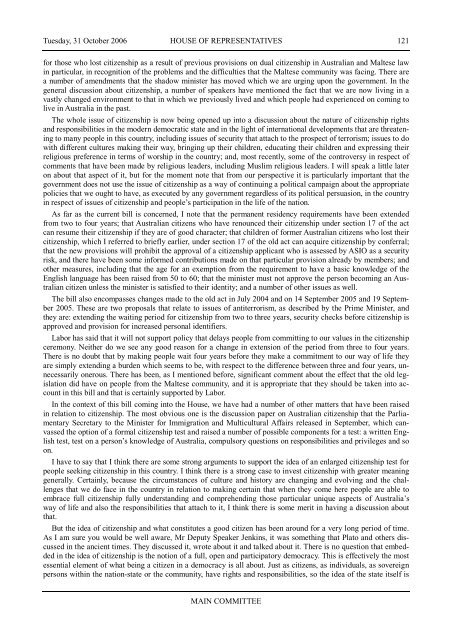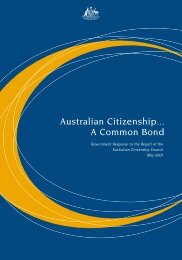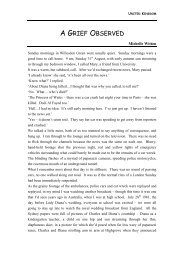HOUSE OF REPRESENTATIVES - The Southern Cross Group
HOUSE OF REPRESENTATIVES - The Southern Cross Group
HOUSE OF REPRESENTATIVES - The Southern Cross Group
You also want an ePaper? Increase the reach of your titles
YUMPU automatically turns print PDFs into web optimized ePapers that Google loves.
Tuesday, 31 October 2006 <strong>HOUSE</strong> <strong>OF</strong> <strong>REPRESENTATIVES</strong> 121<br />
for those who lost citizenship as a result of previous provisions on dual citizenship in Australian and Maltese law<br />
in particular, in recognition of the problems and the difficulties that the Maltese community was facing. <strong>The</strong>re are<br />
a number of amendments that the shadow minister has moved which we are urging upon the government. In the<br />
general discussion about citizenship, a number of speakers have mentioned the fact that we are now living in a<br />
vastly changed environment to that in which we previously lived and which people had experienced on coming to<br />
live in Australia in the past.<br />
<strong>The</strong> whole issue of citizenship is now being opened up into a discussion about the nature of citizenship rights<br />
and responsibilities in the modern democratic state and in the light of international developments that are threatening<br />
to many people in this country, including issues of security that attach to the prospect of terrorism; issues to do<br />
with different cultures making their way, bringing up their children, educating their children and expressing their<br />
religious preference in terms of worship in the country; and, most recently, some of the controversy in respect of<br />
comments that have been made by religious leaders, including Muslim religious leaders. I will speak a little later<br />
on about that aspect of it, but for the moment note that from our perspective it is particularly important that the<br />
government does not use the issue of citizenship as a way of continuing a political campaign about the appropriate<br />
policies that we ought to have, as executed by any government regardless of its political persuasion, in the country<br />
in respect of issues of citizenship and people’s participation in the life of the nation.<br />
As far as the current bill is concerned, I note that the permanent residency requirements have been extended<br />
from two to four years; that Australian citizens who have renounced their citizenship under section 17 of the act<br />
can resume their citizenship if they are of good character; that children of former Australian citizens who lost their<br />
citizenship, which I referred to briefly earlier, under section 17 of the old act can acquire citizenship by conferral;<br />
that the new provisions will prohibit the approval of a citizenship applicant who is assessed by ASIO as a security<br />
risk, and there have been some informed contributions made on that particular provision already by members; and<br />
other measures, including that the age for an exemption from the requirement to have a basic knowledge of the<br />
English language has been raised from 50 to 60; that the minister must not approve the person becoming an Australian<br />
citizen unless the minister is satisfied to their identity; and a number of other issues as well.<br />
<strong>The</strong> bill also encompasses changes made to the old act in July 2004 and on 14 September 2005 and 19 September<br />
2005. <strong>The</strong>se are two proposals that relate to issues of antiterrorism, as described by the Prime Minister, and<br />
they are: extending the waiting period for citizenship from two to three years, security checks before citizenship is<br />
approved and provision for increased personal identifiers.<br />
Labor has said that it will not support policy that delays people from committing to our values in the citizenship<br />
ceremony. Neither do we see any good reason for a change in extension of the period from three to four years.<br />
<strong>The</strong>re is no doubt that by making people wait four years before they make a commitment to our way of life they<br />
are simply extending a burden which seems to be, with respect to the difference between three and four years, unnecessarily<br />
onerous. <strong>The</strong>re has been, as I mentioned before, significant comment about the effect that the old legislation<br />
did have on people from the Maltese community, and it is appropriate that they should be taken into account<br />
in this bill and that is certainly supported by Labor.<br />
In the context of this bill coming into the House, we have had a number of other matters that have been raised<br />
in relation to citizenship. <strong>The</strong> most obvious one is the discussion paper on Australian citizenship that the Parliamentary<br />
Secretary to the Minister for Immigration and Multicultural Affairs released in September, which canvassed<br />
the option of a formal citizenship test and raised a number of possible components for a test: a written English<br />
test, test on a person’s knowledge of Australia, compulsory questions on responsibilities and privileges and so<br />
on.<br />
I have to say that I think there are some strong arguments to support the idea of an enlarged citizenship test for<br />
people seeking citizenship in this country. I think there is a strong case to invest citizenship with greater meaning<br />
generally. Certainly, because the circumstances of culture and history are changing and evolving and the challenges<br />
that we do face in the country in relation to making certain that when they come here people are able to<br />
embrace full citizenship fully understanding and comprehending those particular unique aspects of Australia’s<br />
way of life and also the responsibilities that attach to it, I think there is some merit in having a discussion about<br />
that.<br />
But the idea of citizenship and what constitutes a good citizen has been around for a very long period of time.<br />
As I am sure you would be well aware, Mr Deputy Speaker Jenkins, it was something that Plato and others discussed<br />
in the ancient times. <strong>The</strong>y discussed it, wrote about it and talked about it. <strong>The</strong>re is no question that embedded<br />
in the idea of citizenship is the notion of a full, open and participatory democracy. This is effectively the most<br />
essential element of what being a citizen in a democracy is all about. Just as citizens, as individuals, as sovereign<br />
persons within the nation-state or the community, have rights and responsibilities, so the idea of the state itself is<br />
MAIN COMMITTEE




